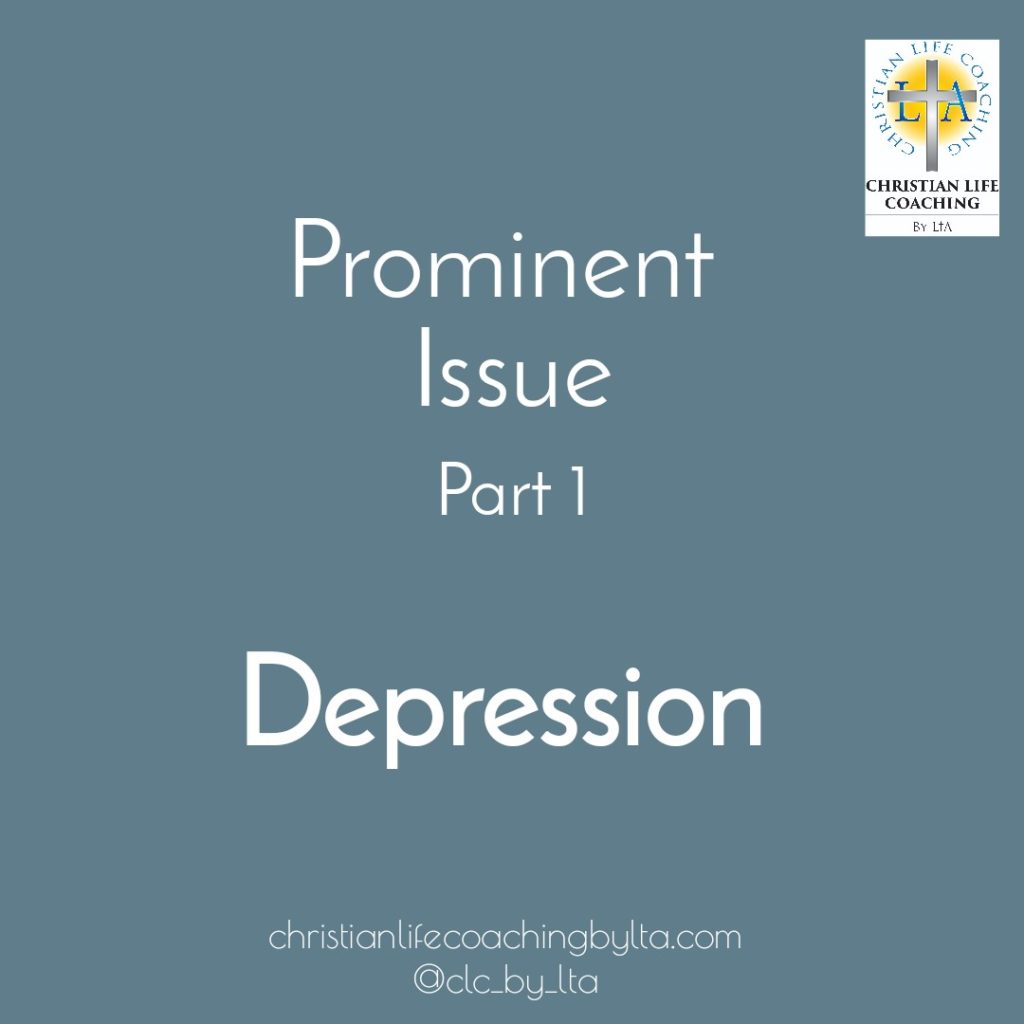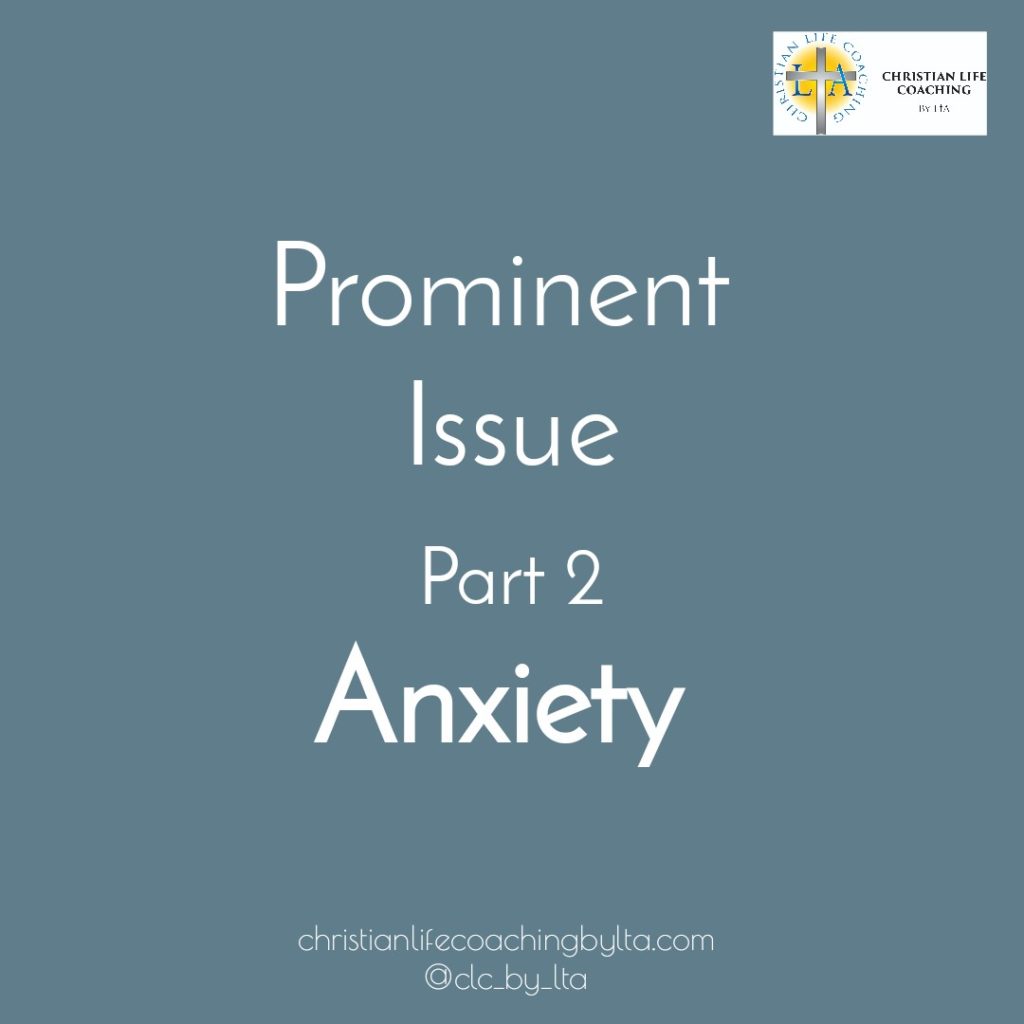Going Deeper Blog
Enrich your journey with christ
Connect with Jesus, God’s Word and your Bible in a powerful way!
Be transformed by the power of God AND enjoy your journey with Christ.

Prominent Issue
Part 1
Depression
Someone suggested that most of our days are three kinds. On mountaintop days everything is going well and the world looks bright. These experiences are temporary: they don’t go on forever. It is unrealistic to expect, as some people do, that we can spend life leaping from one mountain peak to another as if there were no plains or valleys in between. Instead, most of life consists of ordinary days when we work at our usual tasks, neither elated nor depressed. Then there are the dark days when we trudge on through confusion, doubt, discouragement, and sometimes despair. These days may be occasional, or they may string together into months or even years before there is a brighter outlook and a sense of relief. When the dark days persist, they are days of depression.
Depression covers a wide variety of symptoms that differ in severity, frequency, duration and origin. The signs of depression might be grouped into four categories: feelings, thinking, behavior, and physical health. Each of these is a change from what the person experiences and shows when depression is absent.
Feelings: Depression can bring sadness, sometimes for no apparent reason; low self-esteem often accompanied by self-criticism and feelings of guilt, shame, worthlessness, and helplessness; pessimism and hopelessness; and sometimes irritability, so the person is more prone to impatience and loss of temper.
Thinking: Depressed people frequently have negative thoughts. In their minds they ruminate on their own incompetence and lack of worth. Many experience difficulties in concentration, problems with memory, pessimism, guilt, self-criticism, self-condemnation, and sometimes though of self-destruction.
Behavior: Apathy and a sense of inertia are common, so the person lacks motivation and finds it difficult to face decisions.
Physical Health: General fatigue is common, despite more time spent sleeping. Depression brings a loss of energy; a lack of interest in work, sex, religion, hobbies, or other activities.
Depression is a common, complicated condition. Psalm s69, 88, and 102 are songs of despair, but set in the context of hope.
“Save me, O God! For the waters have come up to my neck. 2 I sink in deep mire, where there is no foothold; I have come into deep waters, and the flood sweeps over me. 3 I am weary with my crying out; my throat is parched. My eyes grow dim with waiting for my God. 4 More in number than the hairs of my head are those who hate me without cause; mighty are those who would destroy me, those who attack me with lies. What I did not steal must I now restore? 5 O God, you know my folly; the wrongs I have done are not hidden from you. 6 Let not those who hope in you be put to shame through me, O Lord God of hosts; let not those who seek you be brought to dishonor through me, O God of Israel. 7 For it is for your sake that I have borne reproach, that dishonor has covered my face. 8 I have become a stranger to my brothers, an alien to my mother’s sons. 9 For zeal for your house has consumed me, and the reproaches of those who reproach you have fallen on me. 10 When I wept and humbled my soul with fasting, it became my reproach. 11 When I made sackcloth my clothing, I became a byword to them. 12 I am the talk of those who sit in the gate, and the drunkards make songs about me. 13 But as for me, my prayer is to you, O Lord.
At an acceptable time, O God, in the abundance of your steadfast love answer me in your saving faithfulness. 14 Deliver me from sinking in the mire; let me be delivered from my enemies and from the deep waters. 15 Let not the flood sweep over me, or the deep swallow me up, or the pit close its mouth over me. 16 Answer me, O Lord, for your steadfast love is good; according to your abundant mercy, turn to me. 17 Hide not your face from your servant, for I am in distress; make haste to answer me. 18 Draw near to my soul, redeem me; ransom me because of my enemies! 19 You know my reproach, and my shame and my dishonor; my foes are all known to you. 20 Reproaches have broken my heart, so that I am in despair. I looked for pity, but there was none, and for comforters, but I found none. 21 They gave me poison for food, and for my thirst they gave me sour wine to drink. 22 Let their own table before them become a snare; and when they are at peace, let it become a trap. 23 Let their eyes be darkened, so that they cannot see, and make their loins tremble continually. 24 Pour out your indignation upon them, and let your burning anger overtake them. 25 May their camp be a desolation; let no one dwell in their tents. 26 For they persecute him whom you have struck down, and they recount the pain of those you have wounded. 27 Add to them punishment upon punishment; may they have no acquittal from you. 28 Let them be blotted out of the book of the living; let them not be enrolled among the righteous. 29 But I am afflicted and in pain; let your salvation, O God, set me on high! 30 I will praise the name of God with a song; I will magnify him with thanksgiving. 31 This will please the Lord more than an ox or a bull with horns and hoofs. 32 When the humble see it they will be glad; you who seek God, let your hearts revive. 33 For the Lord hears the needy and does not despise his own people who are prisoners. 34 Let heaven and earth praise him, the seas and everything that moves in them. 35 For God will save Zion and build up the cities of Judah, and people shall dwell there and possess it; 36 the offspring of his servants shall inherit it, and those who love his name shall dwell in it.”
Psalm 69 | ESV
“O Lord, God of my salvation, I cry out day and night before you. 2 Let my prayer come before you; incline your ear to my cry! 3 For my soul is full of troubles, and my life draws near to Sheol. 4 I am counted among those who go down to the pit; I am a man who has no strength, 5 like one set loose among the dead, like the slain that lie in the grave, like those whom you remember no more, for they are cut off from your hand. 6 You have put me in the depths of the pit, in the regions dark and deep. 7 Your wrath lies heavy upon me, and you overwhelm me with all your waves. Selah 8 You have caused my companions to shun me; you have made me a horror to them. I am shut in so that I cannot escape; 9 my eye grows dim through sorrow. Every day I call upon you, O Lord; I spread out my hands to you. 10 Do you work wonders for the dead? Do the departed rise up to praise you? Selah 11 Is your steadfast love declared in the grave, or your faithfulness in Abaddon? 12 Are your wonders known in the darkness, or your righteousness in the land of forgetfulness? 13 But I, O Lord, cry to you; in the morning my prayer comes before you. 14 O Lord, why do you cast my soul away? Why do you hide your face from me? 15 Afflicted and close to death from my youth up, I suffer your terrors; I am helpless. 16 Your wrath has swept over me; your dreadful assaults destroy me. 17 They surround me like a flood all day long; they close in on me together. 18 You have caused my beloved and my friend to shun me; my companions have become darkness.”
Psalm 88 | ESV
“Hear my prayer, O Lord; let my cry come to you! 2 Do not hide your face from me in the day of my distress! Incline your ear to me; answer me speedily in the day when I call! 3 For my days pass away like smoke, and my bones burn like a furnace. 4 My heart is struck down like grass and has withered; I forget to eat my bread. 5 Because of my loud groaning my bones cling to my flesh. 6 I am like a desert owl of the wilderness, like an owl of the waste places; 7 I lie awake; I am like a lonely sparrow on the housetop. 8 All the day my enemies taunt me; those who deride me use my name for a curse. 9 For I eat ashes like bread and mingle tears with my drink, 10 because of your indignation and anger; for you have taken me up and thrown me down. 11 My days are like an evening shadow; I wither away like grass. 12 But you, O Lord, are enthroned forever; you are remembered throughout all generations. 13 You will arise and have pity on Zion; it is the time to favor her; the appointed time has come. 14 For your servants hold her stones dear and have pity on her dust. 15 Nations will fear the name of the Lord, and all the kings of the earth will fear your glory. 16 For the Lord builds up Zion; he appears in his glory; 17 he regards the prayer of the destitute and does not despise their prayer. 18 Let this be recorded for a generation to come, so that a people yet to be created may praise the Lord: 19 that he looked down from his holy height; from heaven the Lord looked at the earth, 20 to hear the groans of the prisoners, to set free those who were doomed to die, 21 that they may declare in Zion the name of the Lord, and in Jerusalem his praise, 22 when peoples gather together, and kingdoms, to worship the Lord. 23 He has broken my strength in midcourse; he has shortened my days 24 “O my God,” I say, “take me not away in the midst of my days—you whose years endure throughout all generations!” 25 Of old you laid the foundation of the earth, and the heavens are the work of your hands. 26 They will perish, but you will remain; they will all wear out like a garment. You will change them like a robe, and they will pass away, 27 but you are the same, and your years have no end. 28 The children of your servants shall dwell secure; their offspring shall be established before you.”
Psalm 102 | ESV
In Psalm 43 King David expresses both depression and rejoicing when he writes:
“Why are you cast down, O my soul, and why are you in turmoil within me? Hope in God; for I shall again praise him, my salvation and my God.”
Psalm 43:5 | ESV
Elsewhere in the Bible it appears that Job, Moses, Jonah, Peter, and the whole nation of Israel experienced depression. Jeremiah the prophet wrote a whole book of lamentations. Elijah saw God’s mighty power at work on Mount Carmel, but when Jezebel threatened murder, Elijah fled into the wilderness, where he plunged into despondency. He wanted to die and might have done so except for the treatment that came from an angel sent by God.
Then there was Jesus in Gethsemane, where he was greatly distressed, an observation that is poignantly described in the words of the Amplified Bible:
“Then He said to them, “My soul is deeply grieved, so that I am almost dying of sorrow. Stay here and stay awake and keep watch with Me.”
Matthew 26:38 | AMP
These examples, accompanied by numerous references to the pain of grieving, show the realism that characterizes the Bible. It is a realistic despair contrasted with certain hope. Each of the believers who plunged into depression eventually came through and experienced a new and lasting joy, even when their circumstances did not change. The biblical emphasis is less on human despair and more on belief in God, and the assurance of abundant life in heaven, if not on earth. Paul wrote:
“We are pressed on every side by troubles, but we are not crushed. We are perplexed, but not driven to despair. 9 We are hunted down, but never abandoned by God. We get knocked down, but we are not destroyed.”
2 Corinthians 4:8-9 | NLT
Our present troubles are quite small and won’t last very long. So we don’t look at the troubles we can see right now; rather, we look forward to what we have not yet seen. For the troubles we see will soon be over.
It is unrealistic to assume that all depression can be prevented. There will be times when the pressures of life are certain to plunge each of us into deep sadness, if not depression. Disappointments, losses, rejections, and failures come to everyone and lead to periods of unhappiness and discouragement. There is a way by which we can prevent or soften the flows of depression.
Trust in God : Writing from prison, the apostle Paul once stated that he had learned to be content in all circumstances.
“ I am not saying this because I am in need, for I have learned to be content whatever the circumstances. 12 I know what it is to be in need, and I know what it is to have plenty. I have learned the secret of being content in any and every situation, whether well fed or hungry, whether living in plenty or in want. 13 I can do all this through him who gives me strength.
Philippians 4:11-13 | NIV
Knowing that God gives strength to his children and is able to supply all our needs, Paul had learned how to live joyfully, both in poverty and in prosperity. Through his experiences, and undoubtedly through a study of the Scriptures, Paul had learned to trust in God, which helped to prevent depression.
A conviction that God is alive and in control can give hope and encouragement, even when we are inclined to be discouraged and without hope.
Keeping a realistic perspective on life and death and our eyes on God can do much to effectively combat the problem of depression.
I pray that God, Who gives you encouragement, will keep you joyful and full of peace as you believe in Him. May you overflow with the hope through the power of the Holy Spirit.
God bless, LtA ♥
______________________


Prominent Issue
Part 2
Anxiety
Anxiety, stress, fear, phobia, panic and tension are words that have different technical meanings but are often used interchangeably.
Anxiety is an inner feeling of apprehension, uneasiness, worry and/or dread that is accompanied by a heightened physical arousal. In times of anxiety, the body appears to be on alert, ready to flee or fight. The heart beats faster, blood pressure and muscle tensions increase, neurological and chemical changes occur within, and the person may feel faint, jumpy, and unable to relax or sleep. Anxiety can arise in response to some specific danger or it may come in reaction to an imaginary or unknown threat.
The Bible views anxiety in two ways, as a healthy concern and as fret or worry.
Anxiety in the form of realistic concern is neither condemned nor forbidden. Paul wrote that he was not anxious about the possibility of being beaten, cold, hungry, or in danger, but he did experience anxiety about the welfare of the churches. This sincere care for others puta daily burden on the apostle and made Timothy genuinely anxious as well.
“in toil and hardship, through many a sleepless night, in hunger and thirst, often without food, in cold and exposure. 28 And, apart from other things, there is the daily pressure on me of my anxiety for all the churches.”
2 Corinthians 11:27-28 | ESV
“I have no one like him, who will be genuinely anxious for your welfare.”
Philippians 2:20 | RSV
Anxiety as fret and worry appears to be what Jesus had in mind in the Sermon on the Mount. He taught that we should not worry about the future or about life’s basic needs, such as food and clothing. We have a heavenly father, Jesus said, who knows what we need and will provide.
“That is why I tell you not to worry about everyday life—whether you have enough food and drink, or enough clothes to wear. Isn’t life more than food, and your body more than clothing? 26 Look at the birds. They don’t plant or harvest or store food in barns, for your heavenly Father feeds them. And aren’t you far more valuable to him than they are? 27 Can all your worries add a single moment to your life? 28 “And why worry about your clothing? Look at the lilies of the field and how they grow. They don’t work or make their clothing, 29 yet Solomon in all his glory was not dressed as beautifully as they are. 30 And if God cares so wonderfully for wildflowers that are here today and thrown into the fire tomorrow, he will certainly care for you. Why do you have so little faith? 31 “So don’t worry about these things, saying, ‘What will we eat? What will we drink? What will we wear?’ 32 These things dominate the thoughts of unbelievers, but your heavenly Father already knows all your needs. 33 Seek the Kingdom of God above all else, and live righteously, and he will give you everything you need. 34 “So don’t worry about tomorrow, for tomorrow will bring its own worries. Today’s trouble is enough for today.”
Matthew 26:25-34 | NLT
In the New Testament Epistles, both Peter and Paul echoed this conclusion.
“Cast all your anxiety on him because he cares for you.”
1 Peter 5:7 | NIV
“Do not be anxious about anything, but in every situation, by prayer and petition, with thanksgiving, present your requests to God. 7 And the peace of God, which transcends all understanding, will guard your hearts and your minds in Christ Jesus.”
Philippians 4:6-7 | NIV
Anxiety as fret and worry comes when we turn from God, shift the burdens of life on to ourselves, and show by our attitudes and actions that we alone are taking responsibility for handling problems. Instead of acknowledging God’s sovereignty and power, or determining to live for him and make His kingdom our primary concern.
“But seek first the kingdom of God and his righteousness, and all these things will be added to you.”
Matthew 6:33 | ESV
Many slip into sinful self-reliance and preoccupation with our own life pressures.
The Bible does not say there is anything wrong with facing anxious situations honestly or with using our God-given brains to find ways from dealing with the identifiable problems of life. To ignore danger is foolish and wrong. Christians can move forward with confidence, especially if they commit their actions to God and seek His guidance. But it is wrong, and unhealthy, to be immobilized by excessive worry. Our persisting concerns must be committed in prayer to God, Who, sometimes working through Christian coaches and counselors, can release us from paralyzing fear or anxiety and can free us to deal realistically with the need and welfare both of others and of ourselves.
Philippians 4 is a formula for preventing anxiety.
- Trust in God
The person who learns to walk in daily contact with God comes to agree with hymn writer who wrote, “I know not what the future holds, but I know who holds the future.” This conviction that God is in control can bring great security even when others are inclined to be anxious. The Bible encourages realistic confrontation with problems and flexible decision making while maintaining an underlying confidence in the sovereignty and wisdom of an all-powerful God.
- Learn to Cope
Coping with the causes of anxiety, when and before they arise, can prevent the development of anxiety. These skills become part of a person’s lifestyle. Such coping skills include:
Admitting fear when it arises.
Talking to a trusted friend or professional.
Building self-esteem.
Working on relationships.
Being involved in meaningful work/activities.
Effective communication skills.
Relaxation skills.
Time management skills.
Restructuring priorities.
Seeking help from God and others.
- Keep Things in Perspective
How someone evaluates a situation depends largely on their perspective or point of view. Try not to make immediate assumptions that the worst is likely to happen.
- Reach Out to Others
Caring about others and reaching out to help may be among the most effective ways to deal with the cares and anxieties in one’s own life. Bearing one another’s burdens can be effective ways to prevent anxiety.
God knows about our needs and anxieties. Jesus said if we give Him first priority in our lives, we can rest assured that our needs will be supplied and there will be no need to worry.
It is difficult to never worry about anything. It is not easy to cast our burdens on the Lord and to trust that God will meet our needs. We don’t always know when to wait for His help and when we should take responsibility for meeting a difficult, anxiety-producing situation. Impatience often accompanies anxiety, and anxious people want help in handling their pressures quickly. It can be very hard to wait for God’s perfect timing.
A Christian counselor or life coach can help you see God’s promises, recognize His power and influence in your daily life, and take action when appropriate.
I pray that God, Who gives you peace, will keep you joyful as you believe in Him. May you overflow with the hope through the power of the Holy Spirit.
God bless, LtA ♥
_________________


Nature of Change
Death and taxes ae the only things in life that are certain. You have probably heard that old adage. We should probably add that in addition to death and taxes, change will be a certainty for almost everybody.
While change is common and familiar, it also can be very difficult and painful. We are more inclined to resist and fear change when things are beyond our control.
As a Christian life coach we are the change specialist that helps you lean into the change agent – the Holy Spirit. A Christian life coach nor you can bring about lasting change. Only the ongoing renewing of your mind through the guidance of the Holy Spirit can do that.
“And do not be conformed to this world, but be transformed by the renewing of your mind, that you may prove what is that good and acceptable and perfect will of God.”
Romans 12:2 | NKJV
In an effort to understand why self-change often fails I will refer to the False Hope Syndrome:
Unrealistic Expectations leads to commitment to change which leads to initial efforts which leads to resistance to change which leads to failure/abandon attempt which leads to finding reasons for failure.
There are ways to prevent the operation of the False Hope Syndrome and to make changes that last.
Set realistic expectations.
Set goals that are attainable.
Be realistic about the ease with which the change will occur.
Focus on successes rather than on failures.
Anticipate relapses.
Be aware of tempting situations and avoid them.
Get support, encouragement, and accountability from a coach or trusted friend.
Challenge the reasons for failure.
God must be a part of the entire process to defend against the spiritual warfare in which Satan and his forces may try to prevent change, especially if there is determination to abandon a sinful habit or develop a more godly lifestyle.
“For we do not wrestle against flesh and blood, but against principalities, against powers, against the rulers of the darkness of this age, against spiritual hosts of wickedness in the heavenly places.?
Ephesians 6:12 | NKJV
Prayer is vital in any sustainable change process and so is a regular commitment to the guidance and influence of the Holy Spirit.
“If any of you lacks wisdom, let him ask of God, who gives to all liberally and without reproach, and it will be given to him.”
James 1:5 | NKJV
Why is change so difficult? And why do people resist change, even when they say they want it? There are many reasons, but the following are among the most common. People resist change because:
- They are unwilling to give up what is safe, predictable and familiar.
- They have no real conviction that change is better than the status quo.
- They have a fear of what life might be like if the change takes place. It feels safer to stay where they are, even though they are miserable.
- They lack the skills, knowledge, abilities, experience, or resources that would make change possible and likely to last.
- The proposed changes are not realistic or practical.
- Other people want the change, but the person does not.
- They don’t believe change is even possible.
- There is no trusted person available to give support and understanding.
When we consider these difficulties, it might be easy to conclude that change, especially lasting change, is next to impossible. But we serve a mighty God Who makes the impossible possible.
“But Jesus looked at them and said to them, “With men this is impossible, but with God all things are possible”
Luke 19:26 | NKJV
The single most important ingredient to bringing lasting change is commitment. Commitment concerns how badly the person wants to change and, more important, how motivated he or she is to maintain the changes once they occur. Often people want very much to change, and they work at doing whatever is necessary until they reach their goals. Then they relax. They assume they have arrived and fail to realize how easily they could fall back into the old patterns. Overconfidence becomes the greatest enemy to lasting change.
No matter what we face, it is the awesome power of God that brings lasting change which might never come otherwise.
Paul gave glory to God because
“Now to him who is able to do immeasurably more than all we ask or imagine, according to his power that is at work within us, 21 to him be glory in the church and in Christ Jesus throughout all generations, for ever and ever! Amen.”
Ephesians 3:20-21 | NIV
Paul prayed that
“out of his glorious riches he may strengthen you with power through his Spirit in your inner being, 17 so that Christ may dwell in your hearts through faith. And I pray that you, being rooted and established in love, 18 may have power, together with all the Lord’s holy people, to grasp how wide and long and high and deep is the love of Christ”
Ephesians 3:16-18 | NIV
The radical and lasting change in Paul’s own life direction was an example of his belief that human effort was of limited value but that he could do everything with the help of Christ who continually gave him the strength he needed.
“For I can do everything through Christ, who gives me strength”
Philippians 4:13 | NLT
I pray that God, Who gives you strength, will keep you joyful and full of peace as you believe in Him. May you overflow with the hope through the power of the Holy Spirit.
God bless, LtA ♥
_________________

Christian Life Coaching
At its core, Christian life coaching is the art and practice of guiding a person or group from where they are to where they believe God wants them to be. Christian life coaching helps people expand their visions, build their confidence, unlock their potential, increase their skills and take practical steps toward their goals.
Christian life coaching is not for those who need traditional therapy to overcome disruptive painful influences from the past. Instead, coaches help people build vision and move forward toward the future. Coaching is not reactive looking back; it’s pro-active looking ahead. It is not about healing; it’s about growing. It focuses less on overcoming weaknesses and more on building skills and strengths.
In Christian life coaching this all revolves around the person of Jesus Christ. Jesus is like the axle at the center, keeping the wheel from spinning off in a variety of directions. This means we commit all of our coaching and lives to His Lordship and direction.
It means that through Scripture reading, prayer, and worship we seek to be men and women who know Him and are more sensitive to the leading of the Holy Spirit. It means that we seek to be clear on our values, lifestyles, and behaviors that are consistent with the Christian principles we commit our lives to.
Christian life coaching involves helping people hear God’s voice, sense His direction for their lives, and seek the Holy Spirit’s guidance to reach God-given goals rather than their goals.
Jesus came to point people to the Father, to show how we could have life everlasting and lives that are more full and abundant.
“All things have been committed to me by my Father. No one knows the Son except the Father, and no one knows the Father except the Son and those to whom the Son chooses to reveal him”
Matthew 11:27 | NIV
“My sheep listen to my voice; I know them, and they follow me. 28 I give them eternal life, and they shall never perish; no one will snatch them out of my hand.”
John 10:27-28 | NIV
A Christian coach helps people imagine ways in which their lives can be better and more consistent with the will of God. A Christian coach walks with people as they make the changes that will improve their careers, their families, their walks with God, their churches and businesses, and their world.
For the sincere Christian, life is built around a committed devotion to Jesus Christ. Christian life coaching should always be a Spirit-guided enterprise that helps people get from where they are to where they sense God wants them to be.
God bless, LtA ♥
_________________
Faith Talk excerpt
Why is it important to have faith, hope and love in our
Christian walk?
- Faith, hope and love are united. Paul tells us in 1 Corinthians 13:13 that these three spiritual gifts remain. “And now these three remain: faith, hope and love. But the greatest of these is love.”
•
•
•
In other words, some spiritual gifts will fade away but these three are permanent and need to be desired and cultivated. These gifts will be ours throughout eternity.
•
•
•
Praying all who believe and have been given the privilege of these lasting gifts know God’s goodness.
God bless, LtA ♥
Available on Amazon in hard cover, paperback and kindle as well as through this website’s store.
________________
Faith Talk excerpt
In a world that demands justice, we can only truly understand the beauty of God’s grace when we understand His love towards us.
Once we grasp the magnitude of His love and the reality of the grace we have been shown, then forgiveness becomes an essential component of our journey with Christ.
Jesus commanded us to forgive or our fellowship with God is hindered. It is not negotiable.
“For if you forgive other people when they sin against you, your heavenly Father will also forgive you. But if you do not forgive others their sins, your Father will not forgive your sins.” Matthew 6:14-15 | NIV
If forgiveness is that important for Jesus to command us to forgive, we should take time to look at how forgiveness and grace intertwine.
Praying you want to forgive quickly and rest in His endless grace.
God bless, LtA ♥
Available on Amazon in hard cover, paperback and kindle as well as through this website’s store.
________
Sonnets for the Soul excerpt
God Speaks in Poems. Jesus is one of the most famous poets of the world.
Approximately one-third of the Bible is poetic. Whole books of the Bible are poetic: Job, Psalms, Proverbs, Song of Solomon. A majority of Old Testament prophecy is poetic in form. Beyond these predominantly poetic parts of the Bible, figurative language appears throughout the Bible, and whenever it does, it requires the same type of analysis given to poetry.
That is a lot of poetry. God can raise the dead by any means He pleases. He can waken dull hearts to the reality of His beauty any way He desires. And one of the ways He pleases to do it is by inspiring His spokesmen to write poetry.
Contemplative communication is not popular. We do not live in a day when poetry is in vogue. A world shaped by smartphones and soundbites, we are impatient with communication that forces us to slow down.
God filled the Bible with all kinds of writing besides poetry. He knows that some people prefer stories, like in the Gospels. Others prefer arguments, like in Romans. So I will understand if you are not a poetry-lover. But don’t limit yourself too quickly. People change. Times change.
This may be the season for you to slow down and reconsider.
Please use the following sonnet devotional to help grow your spiritual pantry, reflect, ponder and increase your intimacy with Christ!
God bless, LtA ♥
Available on Amazon in audiobook, paperback and kindle as well as through this website’s store.
________






TREASURE
What is your treasure? Your kids? Your job? Your home? Your spouse?
Your identity and self-worth come from God. Do you need to re-evaluate your treasure?
If your treasure is put into the hands of God, your hearts will be with Him, and be settled on Him; your desires will be after heavenly things; your affections will be set on things above; your conversation will be in heaven, whilst you are on earth; and that will be the place and seat of your happiness, to all eternity.
“Wherever your treasure is, there the desires of your heart will also be.”
Matthew 6:21 | NIV
God bless, LtA ♥
______

Over Scheduled
Are you over scheduled? We cannot fulfill our life purpose if we are busy and spread too thin. If we are salt and have become tasteless due to overextending ourselves then all of our relationships become affected. Is there anything you can eliminate that will help you glorify the Father?
“You are the salt of the earth, but if the salt has become tasteless, how can it be made salty again? It is no longer good for anything, except to be thrown out and tramped under foot by men.”
Matthew 5:13 | NIV
God bless, LtA ♥
______

Easter
As we reflect and give honor and praise this Easter to our risen Savior, I pray everyone have the courage to invite an unsaved friend, neighbor, coworker or family member to celebrate with you at your place of worship. You have more impact on them than you realize!
God bless, LtA ♥
______

INSECURITIES
We all have insecurities.
Make it a habit to encourage positive qualities in people you encounter throughout your day.
“You, therefore, have no excuse, you who pass judgment on someone else, for at whatever point you judge another, you are condemning yourself, because you who pass judgment do the same things.”
Romans 2:1 | NIV
God bless, LtA ♥
______

WORRY
Would you stop worrying and caring what other people think of you if you realized how seldom they think about you?
Worrying, in essence, is the sin of doubting God’s provision.
“But You, O Lord, are a shield for me, My glory and the One who lifts up my head.”
Psalm 3:3 | NKJV
God bless, LtA ♥
______

Divine BloodLine
Someone in your family history will set the direction for the family line. If you are the first to follow Jesus in your family, you have an awesome opportunity to begin a new bloodline in Jesus!
“Let the redeemed of the Lord say so, Whom He has redeemed from the hand of the enemy”
Psalm 107:2 | NKJV
God bless, LtA ♥
Image: Bakhur Nick/Shutterstock.com
______

forgiveness
Forgiveness is the antacid to any bitterness eating a hole in your soul. Rid the poison with forgiveness.
“And be kind to one another, tenderhearted, forgiving one another, even as God in Christ forgave you.”
Ephesians 4:32 | NKJV
God bless, LtA ♥
Image: Amanda Carden/Shutterstock.com
______

